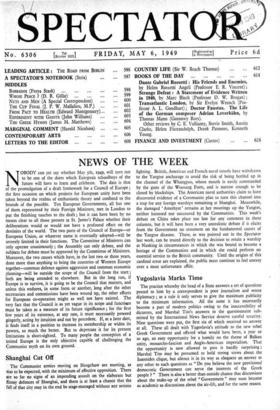NEWS OF THE WEEK
NOBODY can yet say whether May 5th, 1949, will turn out to be one of the dates which European schoolboys of the future will have to learn and celebrate. The date is that of the promulgation of a draft framework for a Council of Europe ; the first occasion on which projects for European unity have been taken beyond the realms of enthusiastic theory and confined to the bounds of the possible. Ten European Governments, all but one of them represented by their Foreign Ministers, met in London to put the finishing touches to the draft ; but it can have been by no means clear to all those present at St. James's Palace whether their deliberations would or would not have a profound effect on the destinies of the world. The two parts of the Council of Europe—or European Union, or whatever name is eventually adopted—will be severely limited in their functions. The Committee of Ministers can only operate unanimously ; the Assembly can only debate, and the subjects for debate must be approved by the Committee of Ministers. Moreover, the two causes which have, in the last two or three years, done more than anything to bring the countries of Western Europe together—common defence against aggression and common economic planning—will be outside the scope of the Council from the start ; both are being attended to elsewhere. But in the long run, if Europe is to survive, it is going to be the Council that matters, and unless this endures, in some form or another, long after the other secretariats and conunissions have been wound up, the other efforts for European co-operation might as well not have existed. The very fact that the Council is as yet vague in its scope and functions must be taken as a measure of its future significance ; for the first few years of its existence, at any rate, it must necessarily proceed gingerly, acting by intuition and not by precedent. If, at a later date, it finds itself in a position to increase its membership or widen its powers, so much the better. But to deprecate it for its present limitations is short-sighted. To many people the conception of a united Europe is the only objective capable of challenging the Communist myth on its own ground.






































